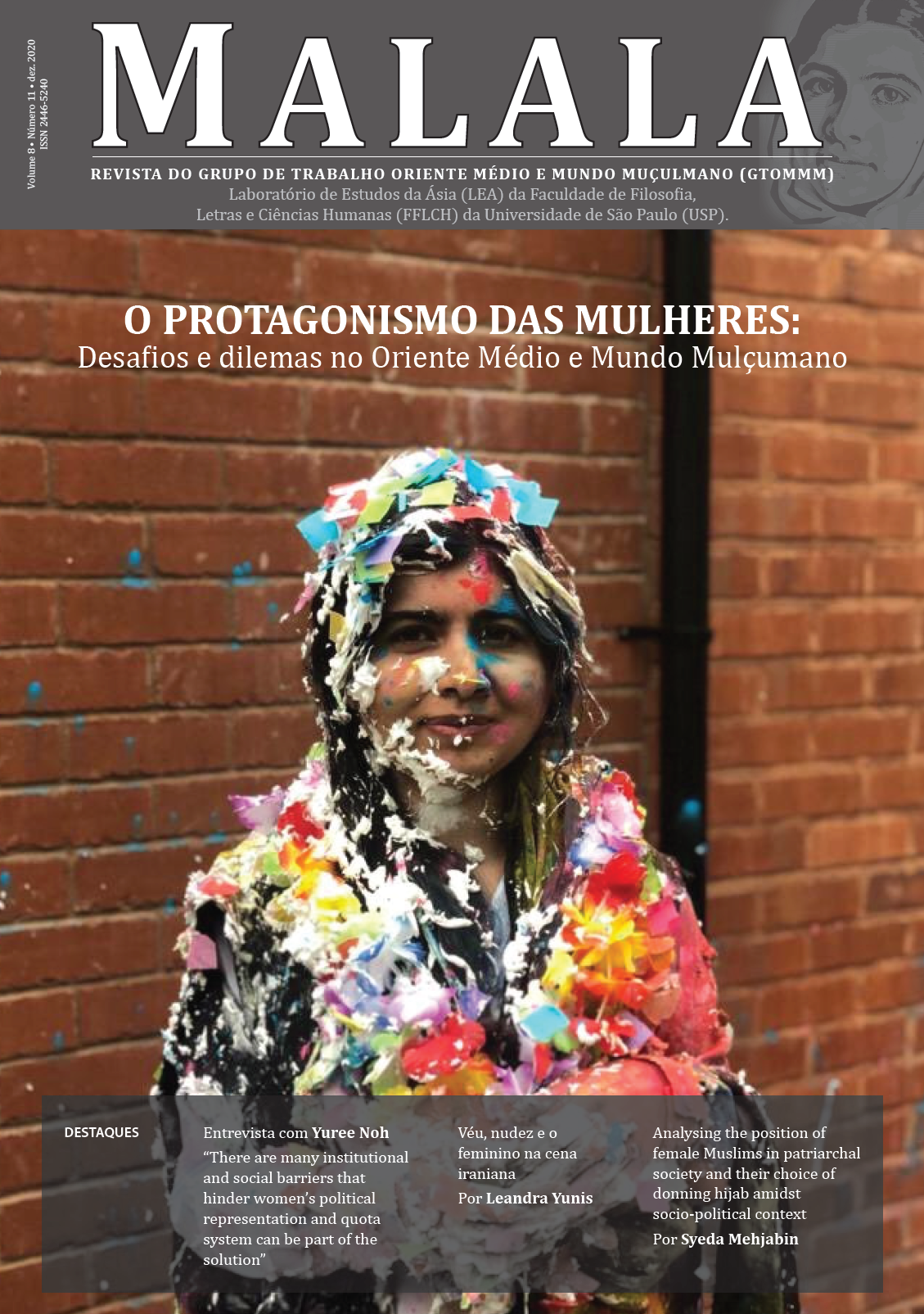Who’s afraid of Islamic Feminism, and why? Raising voices through education
DOI:
https://doi.org/10.11606/issn.2446-5240.malala.2020.159598Keywords:
Feminism, Islamic Feminist Movement, Patriarchy, Islamic Feminist AuthorsAbstract
The Islamic Feminism is a powerful movement which is shaking the patriarchal structure in the Muslim world, since women have largely granted accesses to education. Even though, the movement is not uniform, and it gathers many different voices even, sometimes, disagreeing of its fundamental goals. The essay states that the reinterpretation of the Quranic message – originated in solid education – by the feminists claiming equality in the society is perceived as a threat by the fundamentalist – and in some cases by members of the Political Islam group – and offers a critique of the mainstream male Islamic discourse, based on some Islamic feminist authors interpretation. Ultimately, the essay finishes presenting the case of Malala Yousafzai as a reference. Furthermore, the essay grounds its analyses juxtaposing various interpretations within this movement and among relevant authors and scholars such as Fatema Mernissi and Amina Wadud. It also presents the discussions from two different angles before stating the conclusion of the research.
Downloads
References
Ask, K. and Tjomsland, M. (1998). Women and Islamization. Oxford: Berg. pp.61-62.
Blumberg, N. (2019). Malala Yousafzai | Biography & Facts. [online] Encyclopedia Britannica. Available at: https://www.britannica.com/biography/Malala-Yousafzai [Accessed 6
Jan. 2019].
Channel 4 News. 2015. Malala Yousafzai: ‘I’M A Feminist And A Muslim’. [online] Available
at: <https://www.channel4.com/news/malala-yousafzai-im-a-feminist-and-a-muslim>
[Accessed 17 May 2020].
Esposito, J. (2019). Women - Oxford Islamic Studies Online. [online] Oxfordislamicstudies.
com. Available at: http://www.oxfordislamicstudies.com/print/opr/t243/e370 [Accessed
Jan. 2019].
Ezzat, H., 2002. Rethinking Secularism ... Rethinking Feminism. [online] Islam Online
Archive. Available at: <https://archive.islamonline.net/17501> [Accessed 17 May 2020].
Fazl-e-Haider, S. (2013). Malala versus Extremism Not Taliban, but Talibanization.
[online] Harvard International Review. Available at: https://search.proquest.com/
docview/1470893137?rfr_id=info%3Axri%2Fsid%3Aprimo&accountid=11149 [Accessed
Jan. 2019].
Gibbs, A. (2018). How Nobel Peace Prize Laureate Malala Yousafzai Embraced Feminism.
[online] CNBC. Available at: <https://www.cnbc.com/2018/01/31/malala-yousafzai-onfeminism-and-raising-awareness-about-female-rights.html> [Accessed 17 May 2020].
Hatem, M. (2019). In the Eye of the Storm: Islamic Societies and Muslim Women in Globalization Discourses. [online] Muse.jhu.edu. Available at: https://muse.jhu.edu/article/198833
[Accessed 5 Jan. 2019].
Wadud, Amina. Islam & feminism. (2019). [online] Available at: http://www.islamandfeminism.org/amina-wadud.html [Accessed 5 Jan. 2019].
Malik, S. (2018). Reality Check: Are More Girls In Pakistan Going To School?. [online] BBC
News. Available at: <https://www.bbc.com/news/world-44717345> [Accessed 17 May 2020].
Meringolo, A. (2019). Amina Wadud, portrait of a Muslim feminist. [online] Reset Dialogues
on Civilizations | a venue for all tribes. Available at: https://www.resetdoc.org/story/
amina-wadud-portrait-of-a-muslim-feminist/ [Accessed 5 Jan. 2019].
Mernissi, F. (2011). Beyond the Veil - Male-Female Dynamics in Muslim Society. London: Saqi
Books. pp.171-185.
Mernissi, F. (2009). Muslim Women and Fundamentalism in New Voices of Islam: Reforming
Politics and Modernity: A Reader.. I. B. Tauris & Company, Limited, pp.205-211.
Mernissi, F. (1997). The Forgotten Queens of Islam. 2nd ed. Minneapolis: University of Minnesota Press, p.238.
Moghissi, H. (1999). Feminism and Islamic Fundamentalism. London: Zed Books. pp.43-72.
NobelPrize.org. (2019). The Nobel Peace Prize 2014. [online] Available at: https://www.
nobelprize.org/prizes/peace/2014/yousafzai/facts/ [Accessed 7 Jan. 2019].
Pew Research Center’s Religion & Public Life Project. (2019). Muslim educational attainment
around the world. [online] Available at: http://www.pewforum.org/2016/12/13/muslim-educational-attainment/#gender-differences-remain-despite-substantial-gains-for-women-across-generations [Accessed 4 Jan. 2019].
UNESCO. 2018. [online] Available at: <https://en.unesco.org/sites/default/files/financing.
pdf> [Accessed 17 May 2020].
Wadud, A. (2006). Aishah’s Legacy: The Struggle for Women Rights within Islam in The New
Voices of Islam: Rethinking Politics and Modernity: a Reader. Berkeley: University of California Press, pp.201-204.
Watt, W. (1989). Islamic Fundamentalism and Modernity. London: Routledge, pp.114-117.
World Bank. n.d. World Bank. [online] Available at: <http://documents.worldbank.org/
curated/en/280721531831663216/pdf/124921-REVISED-AFGHANISTANPROMOTINGEDUCATIONPublication.pdf> [Accessed 17 May 2020].
Yousafzai, M. and Lam, C. (2013). I Am Malala. 1st ed. London: Orion Publishing Group. pp.95
Downloads
Published
Issue
Section
License
Copyright (c) 2020 Renan de Souza

This work is licensed under a Creative Commons Attribution-NonCommercial-ShareAlike 4.0 International License.
Esta revista oferece acesso livre ao seu conteúdo, seguindo o princípio de que disponibilizar gratuitamente o conhecimento científico ao público proporciona maior democratização mundial do conhecimento. Não será cobrado nenhum tipo de taxa ao longo do processo de submissão de trabalhos e publicação da revista, bem como para leitura, download, cópia, distribuição, impressão, pesquisa ou referência após sua publicação. Leitores e partes interessadas são livres para compartilhar (copiar ou distribuir o material em qualquer mídia e formato) e para transformar ou adaptar partes do material desde que para uso não comercial e desde que o crédito apropriado seja dado ao autor e à Revista, indicando de que forma os dados foram utilizados e/ou manipulados.





